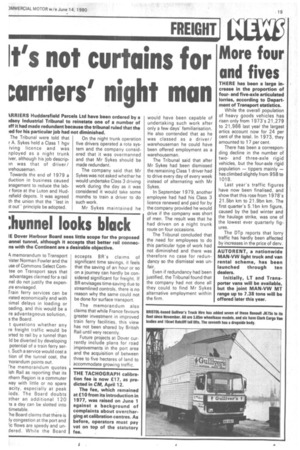It's not curtains for :arriers' night man
Page 21

If you've noticed an error in this article please click here to report it so we can fix it.
BRIERS Huddersfield Parcels Ltd have been ordered by a idsey Industrial Tribunal to reinstate one of a number of aft it had made redundant because the tribunal ruled that the ed for his particular job had not diminished.
The Tribunal were told that r A. Sykes held a Class 1 hgv iving licence and was nployed as a night trunk iver, although his job descrip m was that of driver/ irehouseman.
Towards the end of 1979 a cluction in business caused 3nagement to reduce the labr force at the Luton and H udrsfield depots. It was agreed th the union that the "last in stout' principle be adopted. On the night trunk operation five drivers operated a rota system and the company considered that it was overmanned and that Mr Sykes should be made redundant.
The company said that Mr Sykes was not asked whether he would undertake Class 3 driving work during the day as it was considered' it would take some months to train a driver to do such work.
Mr Sykes maintained he would have been capable of undertaking such work after only a few days familiarisation. He also contended that as he was classed as a driver/ warehouseman he could have been offered employment as a warehouseman.
The Tribunal said that after Mr Sykes had been dismissed the remaining Class 1 driver had to drive every day of every week instead of alternating with Mr Sykes.
In September 1979, another employee had had his Class 3 licence renewed and paid for by the company provided he would drive if the company was short of men. The result was that he had driven on a night trunk route on four occasions.
The Tribunal concluded that the need for employees to do this particular type of work had not diminished and there was therefore no case for redundancy so the dismissal was unfair.
Even if redundancy had been justified, the Tribunal found that the company had not done all they could to find Mr Sykes alternative employment within the firm.
















































































































